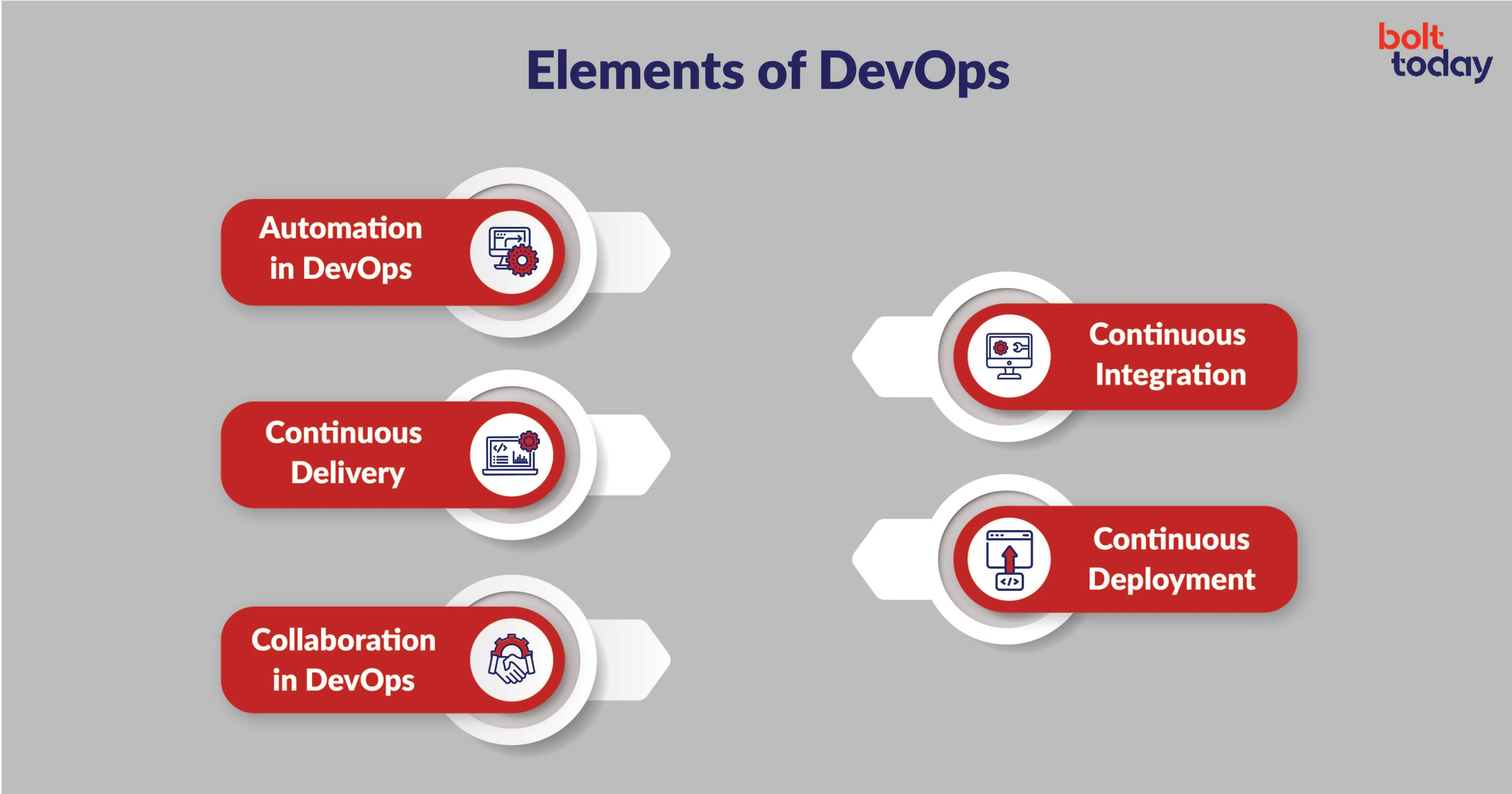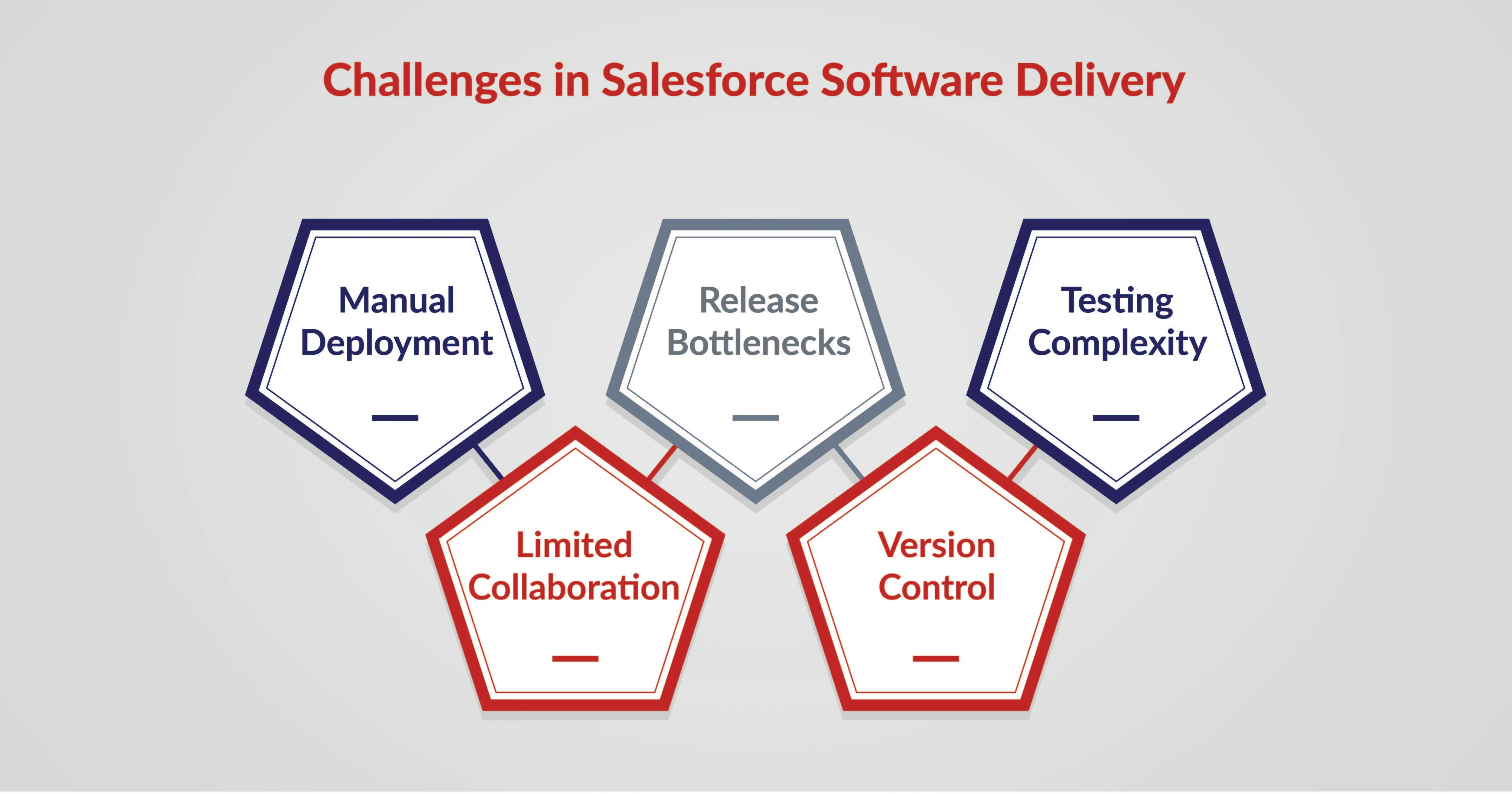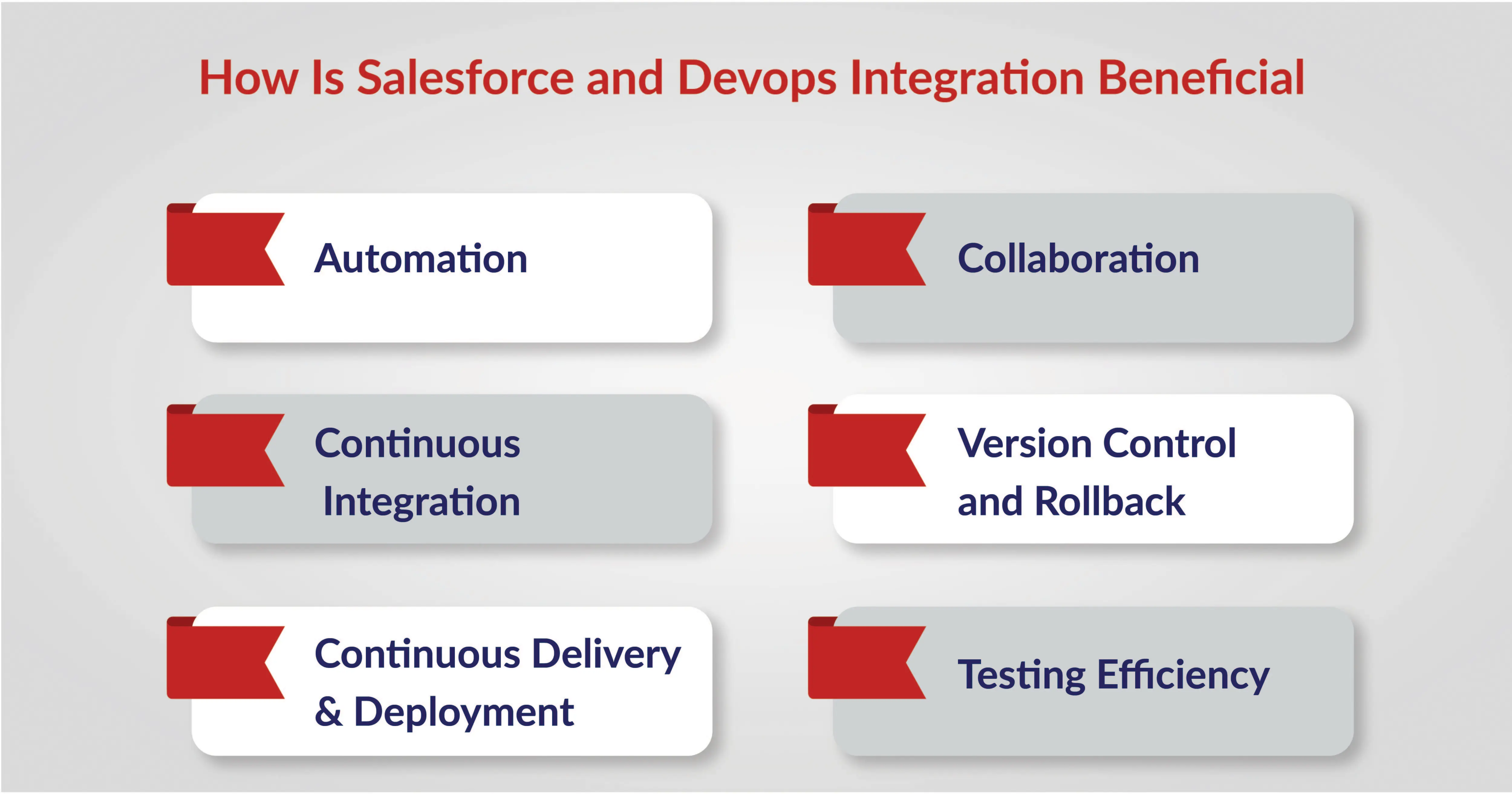Salesforce & DevOps: Efficient Software Delivery

In today's fast-paced and competitive business landscape, efficient software delivery is paramount for success. Organizations across industries are embracing DevOps principles to accelerate their development processes, enhance collaboration, and achieve continuous innovation. Salesforce plays a crucial role in the digital transformation journey of businesses.
Integrating Salesforce with DevOps practices can bridge the gap between traditional software delivery and agile methodologies, enabling organizations to streamline their processes and deliver value to customers at an accelerated pace.
DevOps is a cultural and technical movement that has gained immense traction in the software development landscape. Rooted in the principles of collaboration, automation, and continuous improvement, DevOps aims to bridge the gap between software development and IT operations. This bridge, in turn, accelerates the software development lifecycle, enhances efficiency, and elevates software quality.

Automation in DevOps
Automation is the core of DevOps, infusing every step of the software delivery journey. This precision orchestration, from code integration to deployment, curtails human errors associated with manual actions. The result is a consistent and reliable software development lifecycle.
By embracing automation, DevOps champions efficiency, ensuring a reliable breeding ground for top-notch software solutions.
Continuous Integration (CI)
At the heart of modern software development, Continuous Integration (CI) revolutionizes coding practices. By frequently merging code changes into a shared repository, CI cultivates collaboration and ensures a healthy codebase. Its prime advantage lies in the early detection of integration issues, curbing potential complications.
Embracing CI streamlines the development process, enhances collaboration, and elevates software quality.
Continuous Delivery (CD)
In DevOps, Continuous Delivery (CD) is transformative. It's an automated conductor, deploying code changes flawlessly to a refined staging environment. CD's constant readiness ensures software is primed for production, bolstered by rigorous testing.
This controlled testing ground enhances validation efficiency, enabling seamless transitions to yield a stronger final product.
Continuous Deployment
At DevOps' forefront, Continuous Deployment is a transformative power in software development. An automated conductor orchestrates smooth code transitions to the production environment. Guided by rigorous tests, each release ensures stability and reliability. This seamless process bridges development and operations, eliminating manual bottlenecks and uncertainties.
Continuous Deployment fuels an incessant cycle of innovation and refinement, propelling organizations toward efficient, top-quality software delivery.
Collaboration in DevOps
DevOps redefines collaboration in software development. Breaking free from silos of traditional approaches, DevOps fosters cross-functional teamwork and shared responsibilities. Diverse perspectives harmonize, driving efficiency, agility, and the paramount goal of delivering top-tier software solutions.
This transformative shift creates a tapestry of communication, weaving through development, testing, and operations.
Maximize Your ROI!
Get The Most Out of DevOps!
Challenges in Delivering Salesforce-Based Solutions
Salesforce's versatile platform has revolutionized application building and deployment, yet traditional software delivery methods can impede efficiency and amplify bottlenecks. These challenges stem from manual processes, team compartmentalization, and the absence of automation. Let's delve deeper into each challenge organizations often encounter when delivering Salesforce-based solutions:

Manual Deployment
Manual deployment of Salesforce configurations and customizations can inadvertently introduce errors and consume extensive time. The intricate nature of Salesforce Integration and the need for meticulous replication across environments heighten the risk of inconsistencies. This approach not only hampers deployment speed but also increases the potential for configuration discrepancies that can disrupt operations.
Limited Collaboration
Conventional development methodologies can result in isolated pockets within teams, hindering cross-functional collaboration. Development, testing, and operations teams often operate in silos, failing to share insights and expertise. This isolation impedes seamless knowledge transfer, elongating development cycles and delaying issue resolution.
Release Bottlenecks
In the absence of automation, the release process becomes a bottleneck that curtails the timely delivery of new features and enhancements. Manual interventions necessary for each release can accumulate, leading to delays and inefficiencies. Consequently, businesses struggle to meet market demands and respond swiftly to customer needs.
Version Control
Salesforce's metadata management lacks robust version control mechanisms, making it challenging to track changes accurately. This deficiency can amplify confusion and hinder rollbacks to prior configurations. The absence of a structured version control system exposes organizations to risks associated with unauthorized changes and data loss.
Testing Complexity
Testing Salesforce applications against diverse configurations and integrations can be intricate and resource intensive. The intricacies of interactions between Salesforce and external systems or integrations necessitate comprehensive testing to ensure robust functionality. The lack of efficient testing mechanisms can result in incomplete test coverage and potential issues in production.
Addressing the Challenges
Automation:
Implement automated deployment processes that eliminate manual errors and ensure consistency across environments. Tools like Salesforce DX and deployment pipelines can streamline this.Collaboration Platforms:
Foster collaboration among teams by utilizing collaborative platforms, ensuring shared insights, efficient communication, and a culture of cross-functional cooperation.CI/CD Pipelines:
Set up Continuous Integration (CI) and Continuous Delivery (CD) pipelines to automate the release process, expediting feature delivery while reducing manual bottlenecks.Version Control Systems:
Integrate version control systems, such as Git, with Salesforce to manage metadata changes systematically, enabling accurate tracking and easy rollbacks.Automated Testing:
Employ automated testing frameworks for Salesforce applications. This approach ensures comprehensive testing across various configurations and integrations, reducing testing complexity and enhancing software quality.
While Salesforce offers a robust platform for building and deploying applications, traditional software delivery approaches can hinder efficiency and introduce obstacles. By addressing these challenges through automation, collaboration, streamlined processes, and robust testing practices, organizations can unlock the full potential of Salesforce, accelerate software delivery, and ensure the successful deployment of high-quality solutions.
Benefits of Salesforce and DevOps Integration
Integrating DevOps into Salesforce can address these challenges and offer numerous benefits:

Automation
Automating the deployment process through DevOps practices offers a multitude of advantages for Salesforce development. Automation tools can dramatically reduce the likelihood of errors that commonly occur during manual deployments. This consistency ensures that the same configurations, customizations, and changes are deployed accurately across different environments, promoting reliability and stability.
Continuous Integration
The integration of Continuous Integration (CI) practices with Salesforce development introduces a proactive approach to identifying and resolving integration issues. Developers frequently merge their code changes into a shared repository, facilitating early detection of conflicts and compatibility challenges. This early problem identification minimizes the risk of integration issues escalating and supports the creation of a coherent and unified codebase.
Continuous Delivery and Deployment
Continuous Delivery (CD) and Deployment mechanisms automate the process of delivering changes to production. This automation leads to a faster time-to-market for Salesforce solutions. Features and improvements are efficiently moved from development to production, eliminating manual bottlenecks and enhancing the agility of the development cycle. The result is a nimble response to market demands and customer needs.
Collaboration
One of the pivotal transformations introduced by DevOps is the fostering of collaboration among cross-functional teams. Developers, testers, and operations personnel collaborate closely to share insights, perspectives, and responsibilities. This synergy enhances communication and knowledge sharing, leading to quicker issue resolution and a smoother software delivery process. Collaboration also breaks down silos, leading to a more cohesive and united workforce.
Version Control and Rollback
Version control systems are integral in tracking changes to Salesforce metadata. This capability enables teams to maintain an accurate history of changes made to the configuration and customization of Salesforce applications. In cases where issues arise or undesirable changes occur, these version control systems allow for seamless rollbacks to previous states. This level of control enhances risk management and ensures the stability of applications.
Testing Efficiency
Automated testing tools significantly enhance the quality of Salesforce applications by enabling comprehensive testing across various scenarios. Automated tests can be run consistently, ensuring that new changes do not introduce regressions or negatively impact existing functionalities. This level of testing efficiency not only boosts the reliability of the software but also accelerates the development cycle by reducing the time required for manual testing.
Implementing DevOps for Salesforce
Version Control for Salesforce Metadata
Utilizing version control systems such as Git for Salesforce metadata management is a pivotal step in implementing DevOps. This approach enables teams to collaboratively track and manage changes to the configuration and customization of Salesforce applications. It fosters a controlled environment where developers can work on different branches, review changes, and maintain a historical record of modifications. This practice ensures transparency, accountability, and the ability to revert to previous states if necessary.
Automation Tools
Leveraging automation tools like Salesforce DX and CI/CD platforms is fundamental for achieving a streamlined and error-free deployment process. Salesforce DX provides development teams with an integrated set of tools for developing, testing, and deploying applications on the Salesforce platform. Integrating these tools with Continuous Integration and Continuous Deployment (CI/CD) pipelines automates the end-to-end deployment process, minimizing manual interventions and reducing the risk of errors that often accompany manual tasks.
Continuous Integration
Implementing Continuous Integration (CI) pipelines is a cornerstone of DevOps for Salesforce. These pipelines automatically build and validate code changes, enabling developers to catch integration issues early in the development cycle. As developers frequently integrate their code into a shared repository, this practice promotes collaboration and ensures that code remains in a deployable state. Automated testing, code quality checks, and integration validations can be seamlessly integrated into the CI process, leading to higher software quality.
Automated Testing
Implementing automated testing frameworks for Salesforce applications is pivotal for maintaining software quality and reliability. These frameworks encompass a range of tests, including unit tests, integration tests, and user acceptance tests. Automated tests validate that new changes do not adversely affect existing functionality and ensure that all components work seamlessly together. By automating testing processes, development teams can improve efficiency, minimize human errors, and achieve consistent and thorough testing coverage.
Environment Provisioning
Applying infrastructure-as-code practices to automate the provisioning of development, testing, and production environments ensures consistent and reproducible setups. Infrastructure-as-code scripts define the configuration of these environments, allowing for rapid and accurate environment creation. This practice eliminates manual configuration discrepancies that often lead to inconsistencies and challenges during deployment.
Monitoring and Feedback
Incorporating monitoring and feedback loops into the development process is essential for identifying and addressing issues promptly. Continuous monitoring of application performance, usage patterns, and user experience provides valuable insights into the application's health. Feedback loops enable developers to iteratively improve software based on real-world usage and user feedback, fostering a cycle of continuous learning and refinement.
Best Practices for Successful Integration
Cultural Shift
A fundamental aspect of successful DevOps integration is recognizing that it's not solely about adopting tools; it's a transformative cultural shift. Embrace a mindset of collaboration, shared responsibility, and perpetual improvement. Encourage teams to work together across traditional boundaries, fostering an environment where open communication and collaboration are paramount. This shift nurtures a culture where agility and innovation thrive, ultimately enhancing the organization's software delivery capabilities.
Start Small
Embarking on the DevOps journey can be overwhelming, especially for larger organizations. Start with a pilot project that serves as a testing ground for your newly adopted DevOps practices. This allows teams to gain valuable insights, identify challenges, and refine processes before scaling them organization-wide. Starting small helps mitigate risks associated with broad adoption and allows for more effective fine-tuning of the practices.
Cross-Functional Teams
Breaking down the silos between development, testing, and operations teams is crucial. DevOps thrives on cross-functional collaboration, where individuals with different skill sets and expertise work together seamlessly. Collaborative teams share ownership of the entire software delivery process, from code creation to deployment and monitoring. This approach fosters faster issue resolution, improved communication, and a sense of collective responsibility.
Feedback and Learning
Creating a culture of continuous learning is central to DevOps success. Encourage teams to seek feedback at every stage of the development lifecycle, from planning and coding to testing and deployment. Constructive feedback allows for iterative improvements, refining processes and enhancing the quality of the software. By embracing feedback loops, organizations can adapt swiftly to changes and evolve their practices over time.
Security and Compliance
Security and compliance should be integral to DevOps practices right from the outset. Embed security considerations into the development process rather than treating them as an afterthought. Implement security testing and compliance checks at each stage to identify vulnerabilities and ensure adherence to industry standards and regulations. By integrating security into DevOps, organizations protect their systems and data while maintaining a rapid and efficient delivery pipeline.
Conclusion
The convergence of Salesforce and DevOps can be a game-changer for organizations seeking to enhance their software delivery processes. By automating deployments, improving collaboration, and embracing continuous integration and delivery, businesses can accelerate their innovation cycles, respond to customer needs more swiftly, and stay ahead in today's dynamic business environment.
Integrating Salesforce with DevOps is not just a technical evolution; it's a strategic move that can empower businesses to achieve their digital transformation goals and deliver exceptional value to their customers.